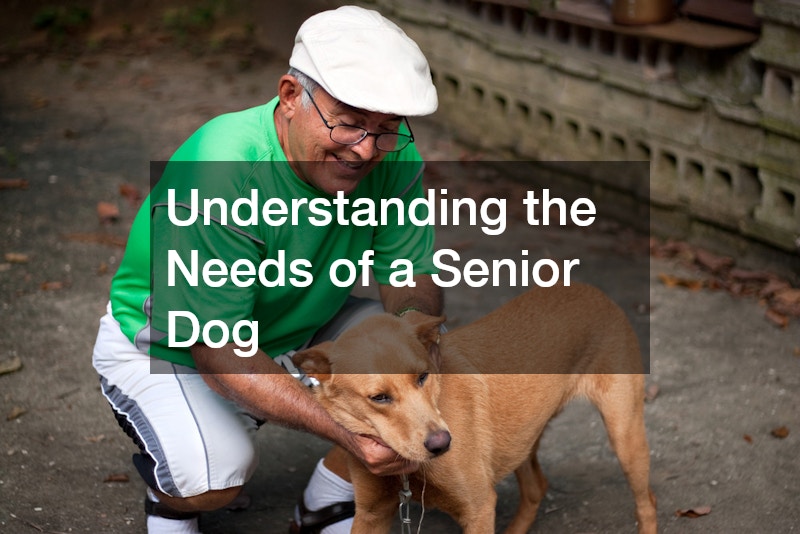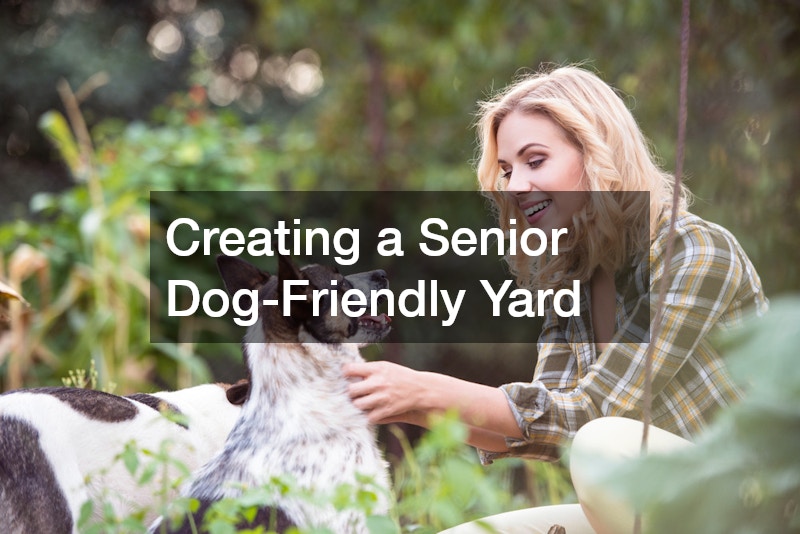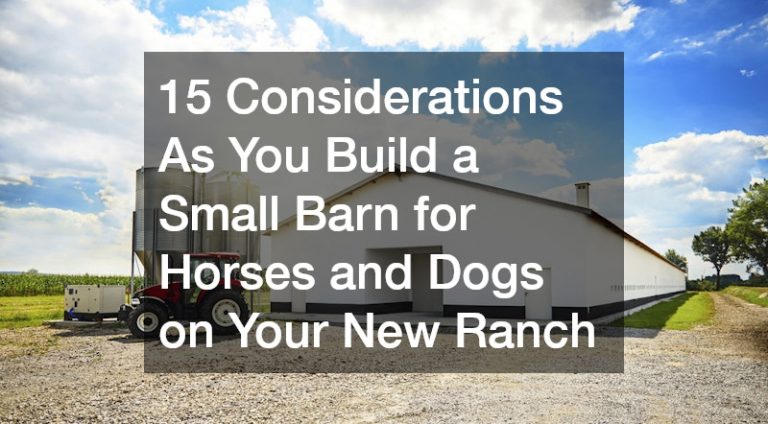Fostering a senior dog can be a rewarding experience, offering these gentle souls a loving environment during their golden years. While it involves a commitment of time and resources, the emotional benefits to both the foster family and the dog are immense. This article will guide you through the process of preparing your home and property to ensure a smooth transition.

Understanding the Needs of a Senior Dog
Senior dogs have unique needs different from their younger counterparts, particularly in terms of mobility, comfort, and health care. When fostering a senior dog, you’ll often need to consider how they navigate spaces, ensuring they have easy access to their favorite spots without risking injury. Facilities like a dog boarding facility can be instrumental in helping them socialize with other dogs in a controlled setting.
Moreover, aged dogs might face health challenges requiring frequent checkups and specific medical attention. An emergency veterinarian is crucial for addressing sudden health issues, providing peace of mind that you can offer the best care possible. Understanding these needs helps in crafting a nurturing environment where your foster feels safe and cherished.
Additionally, a senior dog’s diet and exercise routine will likely differ from younger dogs. Consulting with a vet can help develop a meal plan suitable for their age-related needs while suggesting appropriate exercises to keep them healthy. Remember, fostering is about creating a space where the dog thrives under your care.
How to Make Your Home Safe for a Senior Dog
Your home’s safety is paramount when fostering a senior dog, as their physical limitations might lead to accidents if not properly considered. Start by using an extermination service to ensure the space is free of pests that could harm your dog. Regular inspections and local pest control measures are vital to maintain a clean and safe environment.
Consider the comfort and accessibility of sleeping areas, food bowls, and entryways. Senior dogs may benefit from ramps over stairs or raised feeding stations to reduce strain on their joints. Exploring creative storage solutions for items such as bikes or lawn equipment can make establishing sheds beneficial for both organization and creating a hazard-free zone.
A confident, safe environment enhances your dog’s ability to move freely without fear of injury. It is essential to think about their entire experience, from arriving home after spending time at a dog boarding facility to lounging comfortably at night. This proactive approach ensures your senior dog can enjoy the serenity and love they deserve.
Essential Supplies for Fostering a Senior Dog
Having the right supplies on hand can significantly ease the fostering process and improve your senior dog’s quality of life. Think along the lines of comfortable bedding, specific dietary food, supplements, and grooming tools that cater to their needs. Building a relationship with your local emergency veterinarian can be invaluable, as you can rely on expert advice and services whenever required.
Medical supplies should be part of any senior dog emergency kit, including medications, bandages, and the contact details of your emergency pet hospital. These preparations position you to handle health issues calmly and efficiently, ensuring your dog remains safe and cared for. It’s also wise to invest in protective gear like non-slip mats for hard floors to prevent falls.
To keep a senior dog contented, consider toys and activities that gently engage them physically and mentally. Seeking advice from professionals like a vet, or visiting a dog boarding facility, can provide insights into optimal supplies for stimulation. Your proactive supply preparation lays the groundwork for a stress-free fostering journey.

Training and Socialization for Senior Dogs
Training a senior dog is less about imparting new skills and more about reinforcing positive behavior and addressing any existing issues. Patience is key, as it may take longer for these dogs to learn new commands or routines compared to their younger counterparts. Socialization in a controlled environment, perhaps through sessions at a dog boarding facility, can greatly aid their interaction skills.
When fostering a senior dog, introducing them to new experiences, it is essential to proceed at a pace that respects their comfort levels. They may not be as adventurous or energetic, but spending time on gentle social interactions can greatly enhance their quality of life. These interactions can range from brief walks to calm playdates with other dogs endorsed by a vet.
Positive reinforcement techniques are most effective with senior dogs as they can help reduce stress and anxiety. Reward-based methods develop trust and nurture a sense of security in the dog. Whether dealing with behavior or socialization, approach every training session as an opportunity to solidify your bond and make your home a welcoming space for them.
Preparing Your Yard
Your yard is an extension of your home for a senior dog, and therefore, it also requires thoughtful preparation. Start by conducting soil transformation studies to create a level and safe terrain suitable for their mobility needs. Integration of local pest control measures ensures your yard is free of insects that may present health risks.
While preparing your yard, think about how easy it is for your senior dog to access the space. You might want to explore adding gentle slopes instead of sudden drops to facilitate ease of movement. Consulting with a fencing contractor helps ensure safety while allowing ample space for your dog to explore without the risk of running into dangerous areas.
A well-prepared yard enhances a senior dog’s physical and mental well-being by providing a safe area for exercise and exploration. Thoughtful planning keeps the space engaging and minimizes the chances of accidents. Don’t hesitate to involve a driveway gate installation expert to enhance entry and exit safety, offering full peace of mind as you welcome your foster dog.
Health and Wellness Checkups
Regular health checkups are crucial for any senior dog in foster care, as they can preemptively address many age-related challenges. Developing a relationship with a vet ensures you have access to consistent advice and quality care. Routine assessments can detect conditions early, allowing for a better-managed lifestyle for your foster dog.
Frequent vet visits can help monitor chronic conditions such as arthritis or diabetes common in senior dogs. Allocation of resources towards preventive measures often results in reduced emergency visits, giving peace of mind that your dog is flourishing under your guidance. Trusting your chosen healthcare expert for periodic tests strengthens the idea of full-hearted care.
Beyond regular vet appointments, staying observant of changes in your dog’s behavior or habits is critical. Quick responses to unusual signs can significantly impact their health outcome, as early detection facilitates faster intervention. It’s essential to base your fostering care regime around wellness strategies that promote a long and healthy life for your dog.

Nutrition When Fostering a Senior Dog
Adjusting nutrition to fit the needs of a senior dog is key to maintaining their health during their later years. As a dog ages, their dietary needs change; consulting with a vet helps in developing a meal plan tailored to providing balanced nutrition. High-quality commercial foods for senior dogs are formulated to address specific health concerns like joint health, digestive issues, and weight control.
Adding supplements such as omega-3 fatty acids or glucosamine can support joint health and offer relief from common ailments. These supplements should be vetted by an emergency pet hospital professional to ensure compatibility with any existing health conditions. Overall, a keen focus on nutrition allows you to create a space where your dog can thrive.
Feeding schedules may need adjustments with senior dogs, often necessitating smaller, more frequent meals that conserve energy levels throughout the day. Engaging your dog in food preparation rituals can also improve their appetite, making mealtimes enjoyable and stress-free. Experimenting with wholesome, dog-safe ingredients can offer variety, keeping your foster’s diet nutritionally beneficial.
The Importance of Exercise for Senior Dogs
Exercise remains a fundamental aspect of a senior dog’s life, but the focus shifts to gentle, regular activity tailored to their capacity. Daily walks and low-impact activities promote joint health and cardiovascular conditioning without overexerting them. Any signs of distress during physical activity require immediate attention from services like an emergency veterinarian.
Creating a scheduled routine around exercise fosters a sense of understanding when fostering a senior dog, thereby reducing anxiety. As every dog’s capability varies, it is best to consult a local vet to assess suitable exercise types and durations. This practice makes your home a supportive environment promoting health and longevity.
Incorporating mentally stimulating activities alongside physical ones prevents boredom and reduces anxiety. Puzzle feeders and interactive toys are great additions that provide cognitive challenges, offering a holistic exercise plan. The aim is ensuring your senior canine remains physically active and mentally sharp throughout their foster experience.
Understanding and Managing Chronic Conditions
Chronic conditions such as arthritis, vision loss, or heart disease are common in senior dogs, requiring consistent management to ensure a comfortable life. Routine consultation with your vet can lead to an effective management plan specific to each condition. This proactive approach is essential for monitoring the progression of diseases and adjusting medications as necessary.
Incorporating assistive devices can greatly improve a senior dog’s quality of life. Mobility aids, such as harnesses or orthotic devices, assist with movement, minimizing discomfort and injury risks. These aids, coupled with regular checkups, help establish a comprehensive support system for managing chronic issues.
Educate yourself on signs of discomfort or exacerbation of chronic conditions by consulting resources available through an emergency pet hospital. This knowledge positions you to act swiftly, getting your foster dog the help they need promptly. Understanding your foster dog’s condition builds a nurturing connection, promoting a healthy, compassionate connection.

Creating a Senior Dog-Friendly Yard
Creating a welcoming outdoor environment enhances a senior dog’s quality of life by providing a safe space for relaxation and gentle exercise. Considerations such as non-slip pathways and shaded areas are crucial for managing their skin and joint health. Enlist expert services like a fencing contractor to establish secure perimeter boundaries that prevent accidents.
The installation of a driveway gate adds an extra layer of security, ensuring your dog’s excursions remain trouble-free. Designing an accessible space with varied textures and scents can stimulate their senses, encouraging exploration while preserving safety. Your efforts in crafting a safe home extends from indoors to your carefully planned yard.
With considerations for utility and aesthetics, select vegetation that’s safe for dog interaction, avoiding toxic plants. Integrate resting spots where they can comfortably observe their surroundings, emphasizing their reassurance and emotional well-being. Personalizing your outdoor space with these practices ensures it’s a cherished part of their foster journey.
Preparing for the Emotional Journey of Fostering a Senior Dog
Fostering a senior dog is not only a physical commitment but also an emotionally enriching experience. The journey brings unforeseen challenges that can strain your emotions yet foster deep bonds and mutual enrichment. It’s critical to embrace this emotional component, acknowledging that both highs and lows are part of the fostering process.
Senior dogs, with their dignified demeanor and endearing nature, offer profound companionship that enriches life. This relationship is made possible through patience, care, and understanding of their history and needs. Guaranteeing a loving space promotes a mutually rewarding period that transforms both lives positively.
It’s essential to set realistic expectations and prepare for eventual goodbyes inherent in foster care arrangements. This emotional readiness positions you to offer the best experience for your foster dog throughout their time in your home. Acknowledging the impact of this journey enables a life-changing experience full of cherished memories.
Fostering a senior dog is a beautiful, rewarding journey that requires thoughtful preparation to create a safe, loving environment. From understanding specific needs to creating nurturing spaces, each step plays an integral role in ensuring your foster flourishes. Embrace this opportunity to offer compassion and love, unlocking the rich rewards that this unique experience brings.





